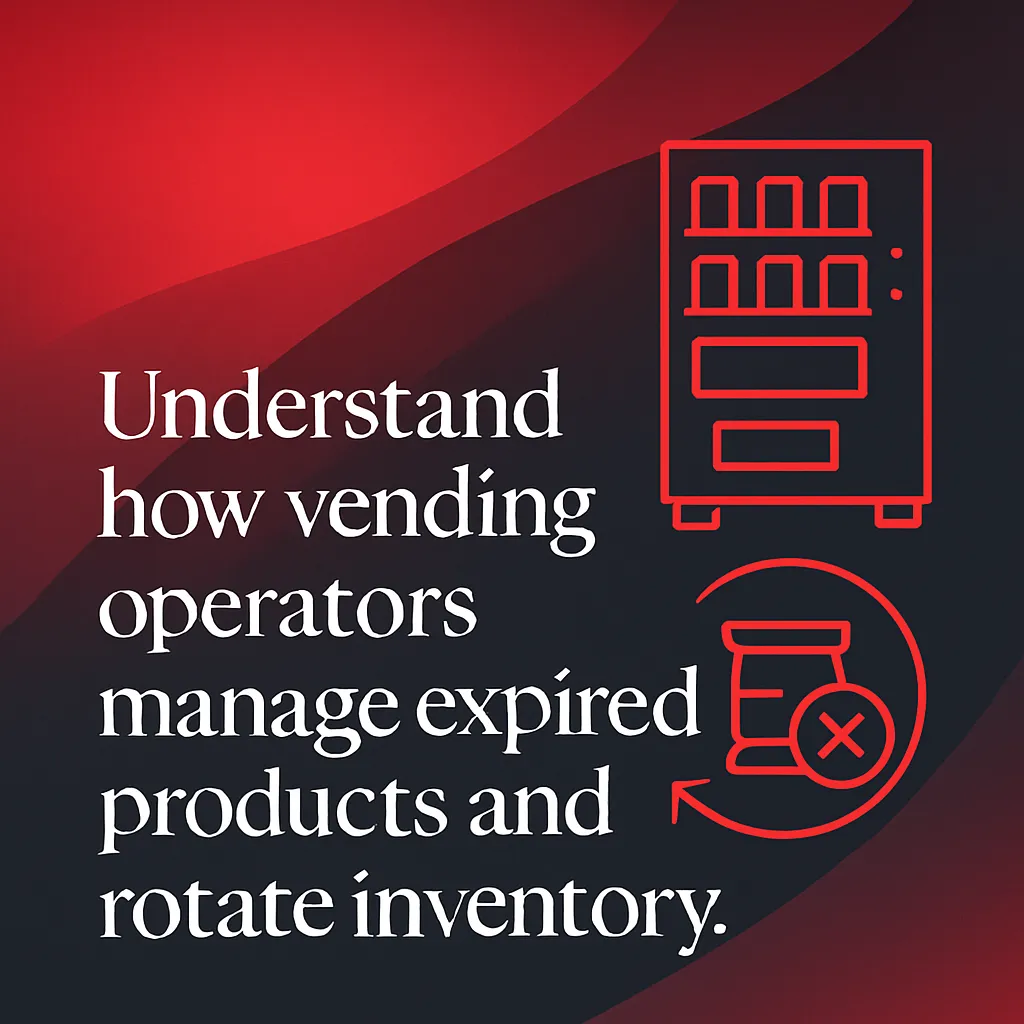What If Vending Machine Products Expire?
Understand how vending operators manage expired products and rotate inventory.
Back to Vending FAQs ResourcesUnderstand how vending operators manage expired products and rotate inventory.
Back to Vending FAQs ResourcesVending machine operators have strict protocols in place to monitor and manage product expiration dates, ensuring customers always receive fresh, high-quality items.
![]() Regular inventory checks and rotation are standard practice
Regular inventory checks and rotation are standard practice
![]() Advanced machines track freshness for proactive management
Advanced machines track freshness for proactive management
![]() Customer satisfaction and safety are top priorities
Customer satisfaction and safety are top priorities

The concern about expired products in vending machines is a valid one for both consumers and businesses. However, reputable vending operators implement rigorous systems to prevent such occurrences and maintain high standards of product freshness. These systems are crucial for ensuring customer safety and satisfaction, which are paramount in the vending industry. Understanding these measures can help address any apprehensions about the quality of items purchased from vending machines.
Modern vending operations utilize sophisticated inventory management techniques to track products from delivery to sale. This often involves a "first-in, first-out" (FIFO) system, where older stock is placed at the front or top of machines to be sold first. Many machines are also equipped with telemetry, a technology that allows operators to monitor sales and inventory levels remotely. This means they know exactly what products are in each machine, how fast they're selling, and when they need to be restocked or rotated. This proactive approach significantly reduces the chances of anything expiring on the shelf. If you're wondering who fills and restocks vending machines, it’s always the responsibility of the operator.
Beyond automated tracking, vending operators conduct frequent physical checks of their machines. During these service visits, products are inspected for expiration dates, packaging integrity, and overall appearance. Any items nearing their expiration date are rotated out, and those that have expired are removed immediately and responsibly discarded. This manual oversight complements technological solutions, providing a dual layer of quality control. This dedication ensures that the customer always receives a fresh product, upholding the trust placed in vending services. For insights into how often these services happen, you might explore more about what full-service vending entails.
Despite the best efforts, if a customer ever encounters an expired product, operators have clear protocols for resolution. Contact information, typically a phone number, email, or QR code, is prominently displayed on machines. Customers are encouraged to report any issues, and operators are generally quick to offer refunds or replacements, demonstrating their commitment to customer satisfaction. This responsiveness builds confidence and reinforces the reliability of vending machines as a source for quick refreshments. Understanding these practices can also inform decisions about questions to ask before signing a vending contract to ensure such provisions are clearly outlined.
Vending machine operators typically conduct regular checks, often weekly or bi-weekly, to ensure products are fresh and within their expiration dates.
Expired products are immediately removed from the machine and disposed of according to health and safety regulations. Operators prioritize product rotation to prevent this.
Many modern vending machines are equipped with telemetry systems that can track inventory and even alert operators to nearing expiration dates, aiding in proactive rotation.
The vending machine operator is fully responsible for monitoring and rotating product inventory to ensure all items sold are fresh and safe for consumption.
Yes, if a customer unfortunately receives an expired product, they should contact the operator for a full refund or replacement. Contact details are typically displayed on the machine.
Operators use strategies like 'first-in, first-out' (FIFO) inventory management, demand forecasting, and frequent restocking to minimize the chance of products expiring in the machine.
Fresh food items, dairy products, and some perishable snacks have shorter shelf lives and require more frequent management compared to packaged goods with longer expiration dates.
Environmental factors like extreme heat or direct sunlight can accelerate spoilage. Operators often place machines in climate-controlled areas or use temperature-controlled machines to mitigate this.
Consuming expired products can lead to foodborne illnesses, digestive issues, or simply an unpleasant taste. Operators prioritize safety to prevent such incidents.
Look for the operator's contact information, usually a phone number or email, displayed prominently on the vending machine. They will address the issue promptly.